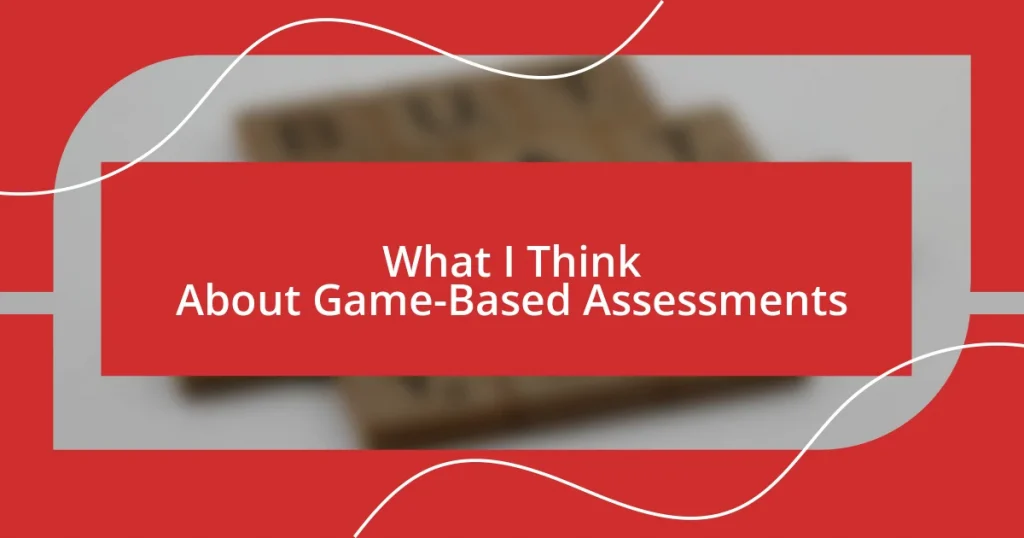Key takeaways:
- Game-based assessments enhance engagement and motivation through interactive learning environments that provide real-time feedback and encourage skill evaluation beyond rote memorization.
- Key challenges include accessibility issues, potential distractions during gameplay, and the difficulties in developing balanced assessments that accurately measure skills.
- Future trends point towards the integration of AI, VR/AR technologies, and cross-disciplinary applications to create personalized and immersive assessment experiences.
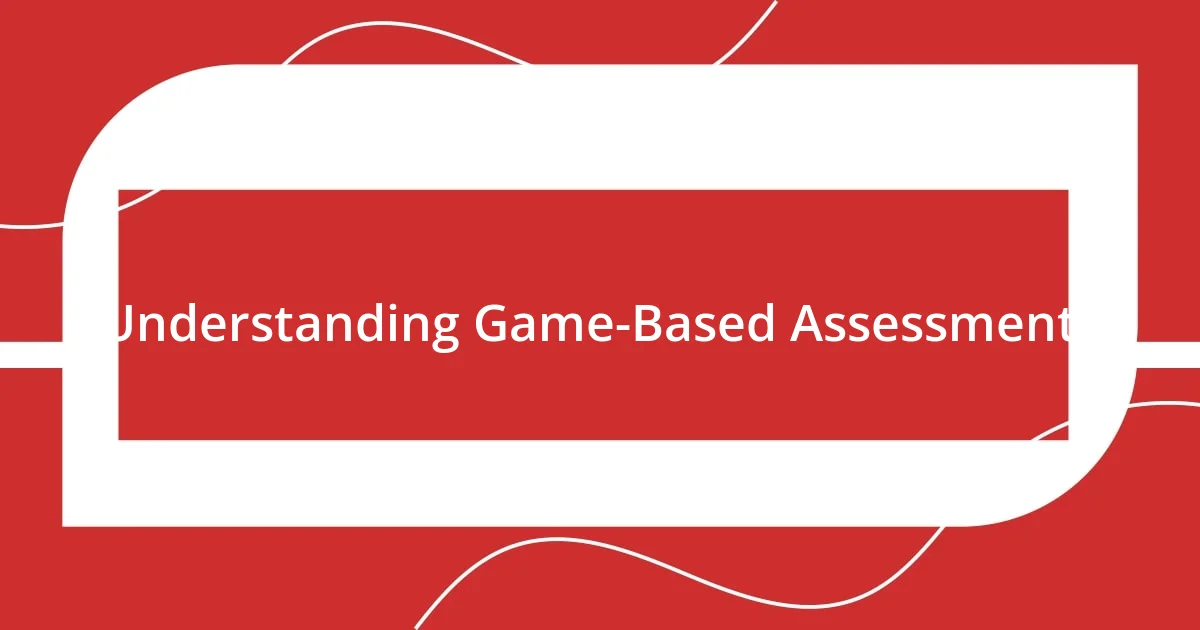
Understanding Game-Based Assessments
Game-based assessments are an innovative approach that combines the thrill of gaming with the rigor of evaluation. I recall my first experience with such an assessment during a leadership training program. It felt refreshing to engage in a simulation that tested my decision-making in real-time, rather than staring at endless spreadsheets. Have you ever found yourself more absorbed in a game than in a traditional test? That’s the magic of it—games can elicit genuine emotional responses, making the assessment feel less like an obligation and more like an adventure.
By incorporating elements of challenge and strategy, these assessments assess not just knowledge but also skills like problem-solving and critical thinking. When I encountered a challenging scenario in the game, I had to adapt quickly to win. Isn’t that how real-life situations unfold? This interactive nature allows individuals to showcase their abilities in a dynamic environment, often revealing strengths and weaknesses that standard assessments may overlook.
Furthermore, game-based assessments can provide immediate feedback, which I find invaluable. Imagine finishing a level and getting instant insights on your performance; it’s like having a coach by your side. This real-time evaluation fosters a growth mindset, encouraging learners to improve continuously. It makes me wonder how traditional assessments might evolve if they embraced more of this engaging approach—wouldn’t that be a game changer?
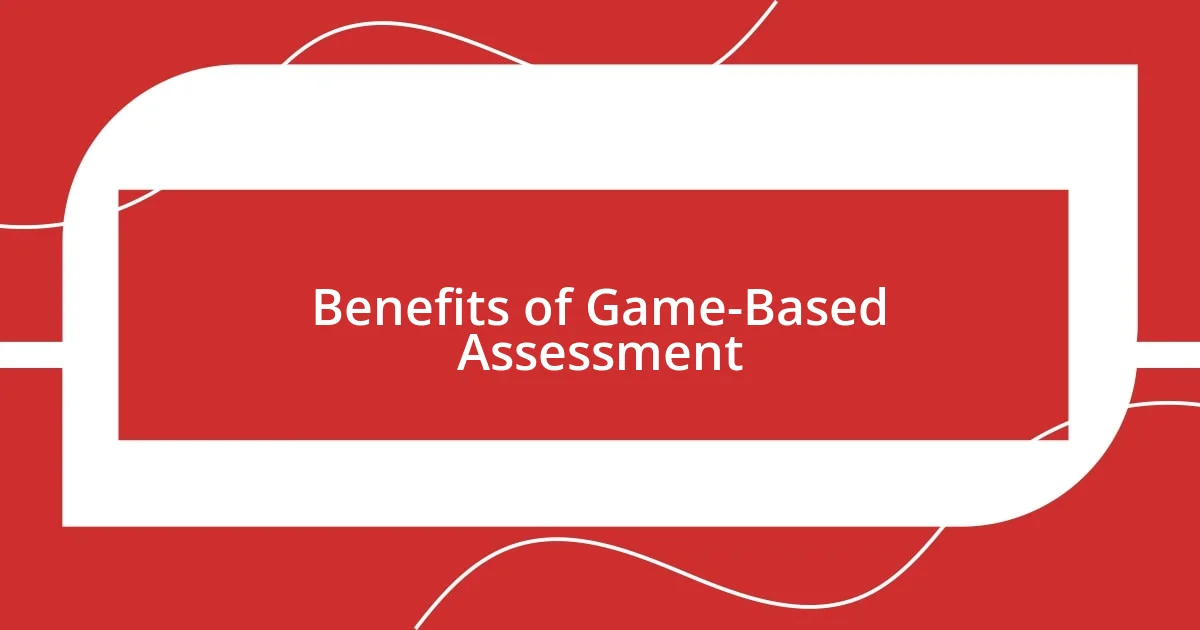
Benefits of Game-Based Assessment
Game-based assessments offer a unique advantage in boosting engagement and motivation. I remember watching a colleague who typically struggled in conventional settings completely transform when faced with a challenge within a game. The excitement in their eyes and their determination to excel was palpable. This enthusiasm can lead to a deeper commitment to learning, making assessments feel less daunting and more like an exciting opportunity for growth.
Here are some benefits I’ve observed:
- Enhanced Engagement: Game mechanics create an enjoyable atmosphere that naturally draws participants in.
- Real-Time Feedback: Players receive immediate insights, helping them identify areas for improvement right away.
- Holistic Skill Evaluation: These assessments go beyond rote memorization, capturing critical thinking, strategy, and teamwork.
- Reduction of Test Anxiety: The playful environment can alleviate the pressure often associated with traditional assessments.
- Encouragement of Risk-Taking: Players are more likely to try out new strategies, knowing it’s part of the game, fostering a culture of exploration.
Each of these benefits makes me reflect on how such assessments could redefine our approach to training and personal development, ultimately creating environments where people thrive.
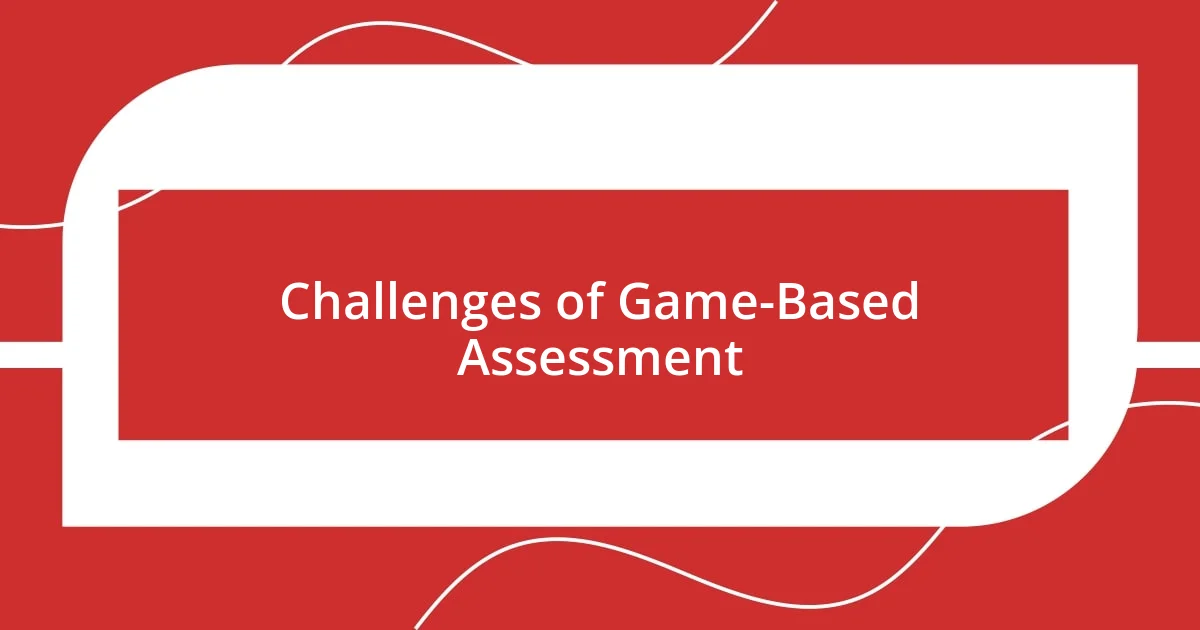
Challenges of Game-Based Assessment
The challenges of game-based assessments can sometimes overshadow their benefits. One major hurdle I’ve come across is the issue of accessibility. Not everyone has the same level of comfort with technology or gaming mechanics. I recall a time when I facilitated a workshop where an experienced professional struggled with the controls, which limited their ability to showcase their true capabilities. Have you ever seen someone’s potential stifled simply because they weren’t familiar with the tools? It’s crucial for assessment creators to consider these disparities.
Another concern that frequently emerges is the potential for distraction in a game-based environment. While engaging, the gameplay elements can sometimes divert attention from learning objectives. I remember a colleague who became so engrossed in the gaming aspects that they overlooked the assessment’s core goals. This raises an important question: How can we strike the right balance between engagement and focus? Finding this balance is essential for ensuring that the assessment remains effective.
Additionally, developing a game that accurately measures desired skills can be challenging. Crafting meaningful assessments that are both fun and fair requires expertise and resources. I once collaborated on a project where we aimed to create a competitive assessment game. Despite our enthusiasm, we ended up with something that felt more like entertainment than evaluation. It taught me that even with the best intentions, balancing enjoyment and rigor is a delicate act.
| Challenge | Description |
|---|---|
| Accessibility | Not all participants may be comfortable with technology, impacting their performance. |
| Distraction | Game elements may detract from the primary learning objectives of the assessment. |
| Development | Creating a balanced game that accurately assesses skills can be resource-intensive. |
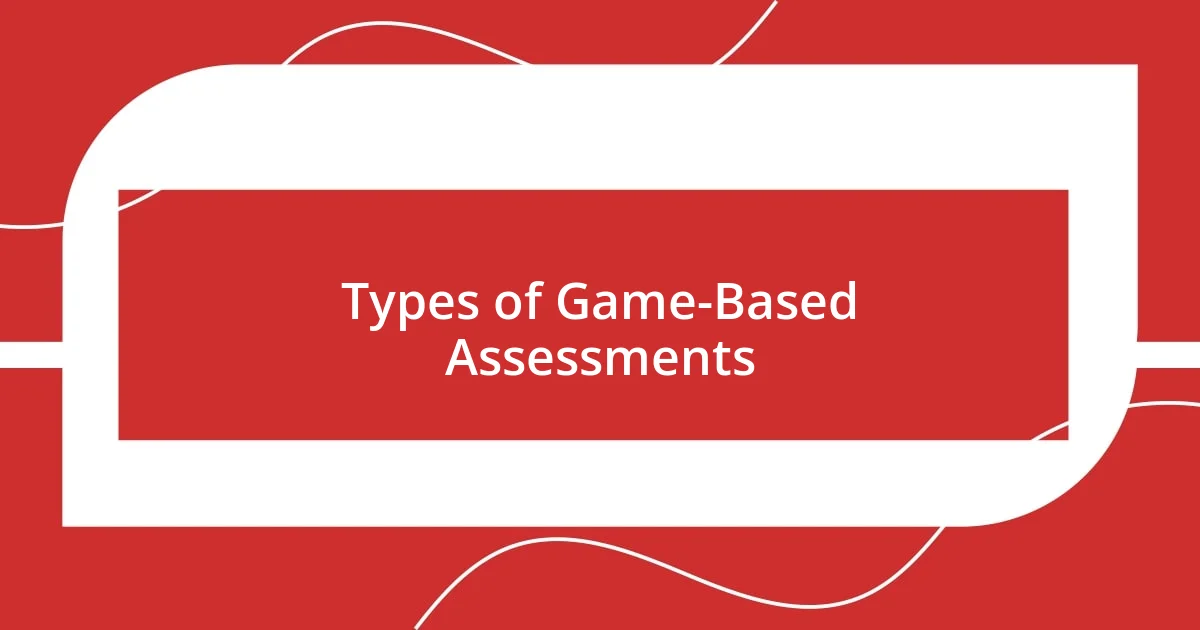
Types of Game-Based Assessments
When it comes to game-based assessments, several types stand out, each with its own flavor and purpose. For instance, simulations often immerse participants in realistic scenarios where they can apply their skills in a controlled environment. I recall using simulation assessments in a leadership development program. Participants had to navigate complex situations, which provided astonishing insights into their decision-making processes. It’s interesting to see how players tend to reveal their true selves under pressure in these setups, isn’t it?
Another form is the quiz-based assessment that incorporates gamification elements. Unlike traditional tests, these quizzes leverage game mechanics, such as point scoring and time limits, to enhance engagement. I once participated in a quiz competition where the friendly rivalry among colleagues transformed our mundane training into a thrilling experience. The playfulness made the learning memorable, sparking conversations that continued long after the event was over.
Lastly, adventure-based assessments are gaining traction. These require participants to tackle challenges that progressively unlock new levels of difficulty. I remember watching a team tackle a challenging obstacle course that mirrored project management scenarios. The synergy in their teamwork and strategic planning was extraordinary! Isn’t it fascinating how these experiences can create strong bonds and boost collaboration among team members? Each type of game-based assessment brings unique benefits, ultimately reshaping how we evaluate skills and knowledge.
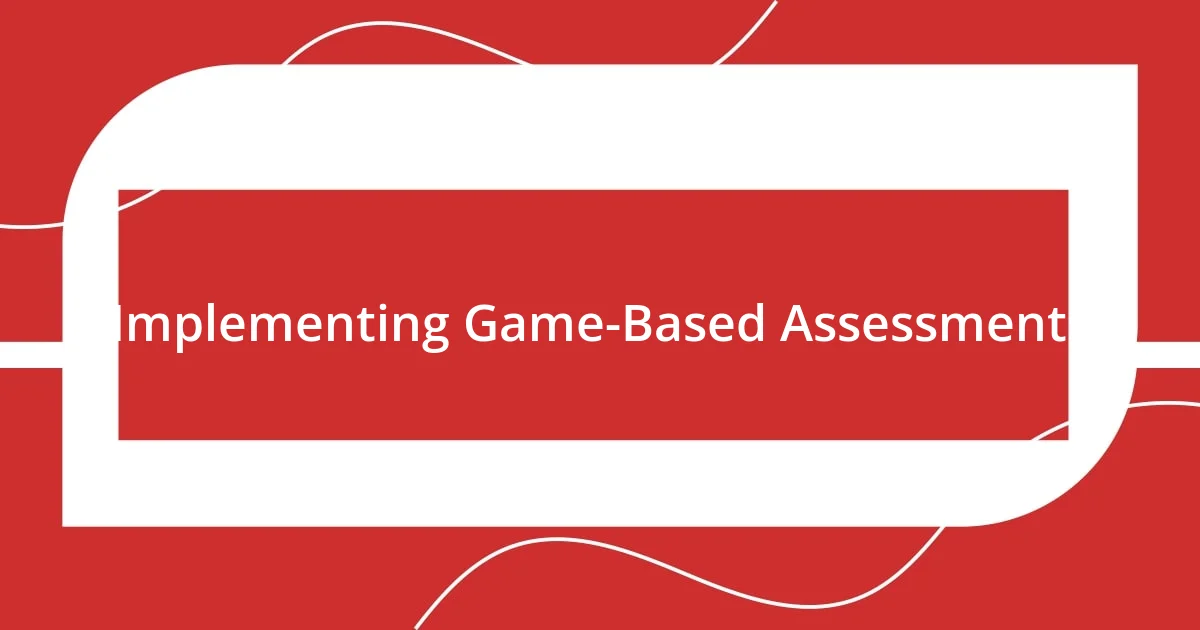
Implementing Game-Based Assessments
Implementing game-based assessments requires a strategic approach to ensure that they effectively measure skills while being engaging and enjoyable. When I was involved in piloting a game-based assessment for a sales team, we had to integrate familiar scenarios that reflected their real-world challenges. The assigned quests not only encouraged critical thinking but also allowed team members to showcase their strengths in collaboration and strategy. Isn’t it rewarding when your assessments mirror the actual experiences of the participants?
One vital aspect I’ve found in this process is the importance of feedback loops within the games. During a progression-focused game we designed, we included instant feedback after each task, vital for fostering continuous improvement. I vividly recall how my teammates relished the immediate reactions—they could swiftly grasp concepts that needed refining. Does instant gratification, coupled with constructive feedback, enhance learning? In my experience, that interaction significantly boosts engagement and understanding, proving essential for successful implementation.
To ensure a smooth rollout, I recommend beginning with pilot programs that focus on smaller groups. This allows for real-time adjustments based on participant reactions and insights. When we introduced a new assessment in my past organization, we initially rolled it out to a select team. Their input shaped our final implementation, making it not only more effective but deeply valued. Have you ever noticed how early involvement can lead to a sense of ownership among participants? It creates a community around the assessment, enhancing both the learning experience and overall outcomes.
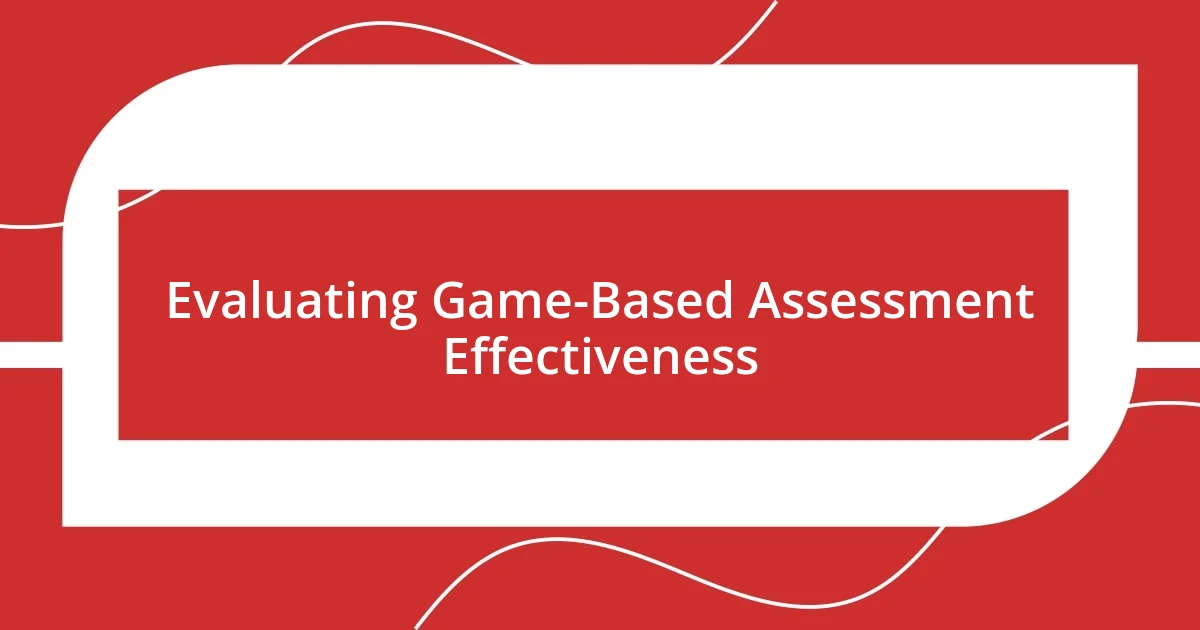
Evaluating Game-Based Assessment Effectiveness
When it comes to evaluating the effectiveness of game-based assessments, I find that the metrics we choose to analyze can make or break our understanding. For instance, during a recent evaluation I conducted for a creative problem-solving game, I noticed that analyzing engagement levels alongside skill improvement provided a more holistic view of its impact. Have you ever found that some players shine brightly in certain areas while struggling in others? It’s that kind of nuanced observation that helps us tailor future assessments.
Another important aspect is participant feedback. I recall a session where players shared their experiences after completing a competitive simulation. Their reflections offered invaluable insights—some appreciated the difficulty level, while others craved more guidance. This dialogue really got me thinking: how can we incorporate these diverse perspectives into our assessment design? Encouraging this kind of openness not only enhances the assessment’s effectiveness but also fosters a sense of community among participants.
Lastly, I believe we should consider the long-term benefits of game-based assessments. For example, after integrating these assessments in a leadership program, we tracked how participants applied learned skills months later. The ongoing development we observed was remarkable. It begs the question: isn’t the ultimate goal of assessment to create lasting change? In my experience, when evaluations focus on sustained growth, we truly can measure the game-based assessment’s success beyond immediate outcomes.

Future Trends in Game-Based Assessments
I can’t help but feel excited about the future of game-based assessments. One trend I see gaining traction is the incorporation of artificial intelligence (AI) to personalize the gaming experience for each participant. During a recent workshop, I witnessed an AI-driven platform adapt scenarios in real-time based on player decisions, which was fascinating. Isn’t it incredible to think how responsive technology could create a truly tailored assessment experience?
Another emerging trend is the integration of virtual and augmented reality (VR/AR). I remember attending a conference where presenters showcased VR simulations designed for training in high-stakes environments. The immersive nature of those assessments made participants feel as though they were in real-life situations. Can you imagine the depth of learning that comes from navigating a virtual crisis? I believe that blending immersive tech with game-based assessments will open doors to a whole new dimension of evaluation.
Moreover, we’re likely to see an increased focus on cross-disciplinary applications. I’ve personally seen how game-based assessments in education can influence corporate training and vice versa. Bouncing ideas off educators and business leaders often reveals unique insights that push boundaries. How do we ensure that we are leveraging the best of both worlds? By fostering collaboration across fields, we can create robust assessments that truly reflect a diverse range of skills and applications.









